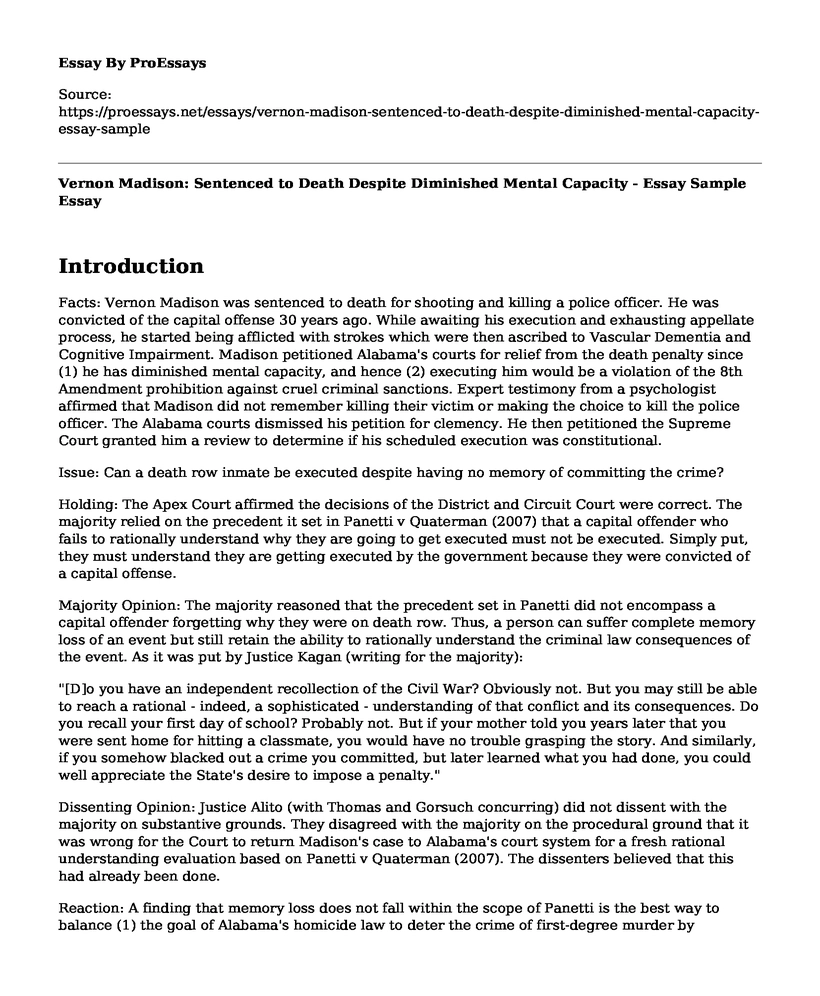Introduction
Facts: Vernon Madison was sentenced to death for shooting and killing a police officer. He was convicted of the capital offense 30 years ago. While awaiting his execution and exhausting appellate process, he started being afflicted with strokes which were then ascribed to Vascular Dementia and Cognitive Impairment. Madison petitioned Alabama's courts for relief from the death penalty since (1) he has diminished mental capacity, and hence (2) executing him would be a violation of the 8th Amendment prohibition against cruel criminal sanctions. Expert testimony from a psychologist affirmed that Madison did not remember killing their victim or making the choice to kill the police officer. The Alabama courts dismissed his petition for clemency. He then petitioned the Supreme Court granted him a review to determine if his scheduled execution was constitutional.
Issue: Can a death row inmate be executed despite having no memory of committing the crime?
Holding: The Apex Court affirmed the decisions of the District and Circuit Court were correct. The majority relied on the precedent it set in Panetti v Quaterman (2007) that a capital offender who fails to rationally understand why they are going to get executed must not be executed. Simply put, they must understand they are getting executed by the government because they were convicted of a capital offense.
Majority Opinion: The majority reasoned that the precedent set in Panetti did not encompass a capital offender forgetting why they were on death row. Thus, a person can suffer complete memory loss of an event but still retain the ability to rationally understand the criminal law consequences of the event. As it was put by Justice Kagan (writing for the majority):
"[D]o you have an independent recollection of the Civil War? Obviously not. But you may still be able to reach a rational - indeed, a sophisticated - understanding of that conflict and its consequences. Do you recall your first day of school? Probably not. But if your mother told you years later that you were sent home for hitting a classmate, you would have no trouble grasping the story. And similarly, if you somehow blacked out a crime you committed, but later learned what you had done, you could well appreciate the State's desire to impose a penalty."
Dissenting Opinion: Justice Alito (with Thomas and Gorsuch concurring) did not dissent with the majority on substantive grounds. They disagreed with the majority on the procedural ground that it was wrong for the Court to return Madison's case to Alabama's court system for a fresh rational understanding evaluation based on Panetti v Quaterman (2007). The dissenters believed that this had already been done.
Reaction: A finding that memory loss does not fall within the scope of Panetti is the best way to balance (1) the goal of Alabama's homicide law to deter the crime of first-degree murder by imposing the death penalty; with (2) the prohibition of cruel punishment under the 8th Amendment. In the State of Alabama, there general rules on criminal liability borrowed from English common law based on the assumption that the law must only punish a person who makes the rational choice to commit a crime. Hence a defendant may raise the defense of criminal insanity if (1) they did not know what they were doing; or (2) appreciate the consequences of their conduct at the time that they committed the crime.
The 8th Amendment prohibits a criminally insane person from being executed but Madison's interpretation of criminal insanity can't be found anywhere in the Constitution, Federal Statutes, or Supreme Court precedents. The defense of criminal insanity does not contemplate that a person can be deemed sane during the commission of the crime but be deemed criminally insane during sentencing or any other post-trial stage.
Cite this page
Vernon Madison: Sentenced to Death Despite Diminished Mental Capacity - Essay Sample. (2023, Mar 13). Retrieved from https://proessays.net/essays/vernon-madison-sentenced-to-death-despite-diminished-mental-capacity-essay-sample
If you are the original author of this essay and no longer wish to have it published on the ProEssays website, please click below to request its removal:
- The Genetics of Autism. Paper Sample
- How Does the Traditional or Cultural Belief Influence the Prevalence of Mental Health in Individuals
- Essay Sample on Aboriginal Health and Cultural Safety
- Music Therapy Beneficial in Reducing Maternal Stress and Anxiety During Cesarean Section
- Hot Coffee Documentary: Summary Paper Example
- Essay Sample on Protecting Privacy: Ensuring Sensitivity & Secrecy
- Essay Sample on Investigative Bureau: Keeping Escondido Safe From Criminal Activity







